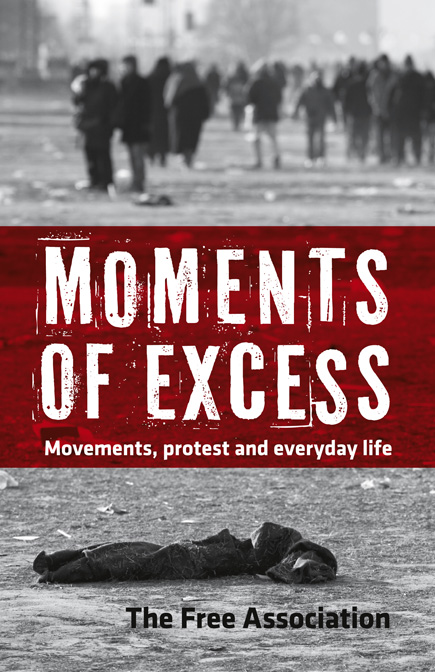Moments of Excess, a Free Association anthology, is now available here. It’s a project that’s taken the best part of a year to realise, but it’s not the usual tale of missed deadlines. As the book’s introduction says:
The texts collected here were written over a ten year period from summer 2001 to January 2011. All were initially written as interventions, one way or another, so it’s no surprise that they betray their origin and context. One or two were originally written for books, some appeared in ‘movement’ publications such as Derive Approdi and Turbulence, and most were also handed out as self-published booklets in the heat of the moment. Yet as we assembled this edition, we were struck by how well the articles hang together as a collection. They are coherent—and they tell a story.
In fact, as we re-read the texts we were both tempted to update them in the light of recent events and simultaneously struck by how much sense they still made. The final article, Re:generation, was initially conceived, early in 2010, as a simple postscript to the other texts, a piece that would tie up loose ends and draw our story to a close. But when we sat down to think about it at the end of last year, of course we discovered that events had taken place and things had moved—as they always do. And how could we not think and attempt to make sense of these movements? More than a simple coda, it opens up more than it closes down.
So what is the story of Moments of Excess? As we re-read the texts, at least three different narratives emerged from the threads that run through them. The first is a tale about the movement of movements, focused on the cycle of counter-summit mobilisations that is usually reckoned to have begun with the WTO Seattle meeting in November 1999. Looking back now, it seems clear that this cycle has come to an end—first stalled and then definitively thrown aside by the economic crisis that ripped across the planet in 2008.
But this isn’t just a historical anthology: there’s a second, wider thread about the form of politics appropriate to the world we live in. Neoliberalism’s ideology of permanent progress through growth may have been shattered by the economic crisis, but it staggers on, zombie-like—and unprecedented cuts in public expenditure across the world are actually expanding its programme of social decomposition. As cracks appear in the most unlikely of places, there’s space to ask the one question worth asking: what sort of world do we want to live in?
And finally there is an even older narrative—the story of ‘the old mole that can work in the earth so fast, that worthy pioneer—the Revolution’. These are whispers across time and space that can’t be silenced. However it’s expressed—‘Omnia sunt communia’, ‘The poor shall wear the crown’, ‘Que se vayan todos’—we hear the same refusal, the same desire to stop the world as we know it and create something else. Who knows? By tomorrow, this book may well be meaningless, rendered irrelevant by the grubbing of that old mole. We are, after all, part of ‘the real movement which abolishes the present state of things’.
(But in the meantime, do yourself a favour and get hold of a copy…)


1 Comment